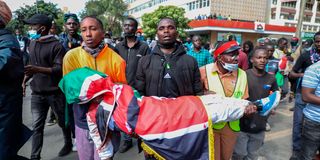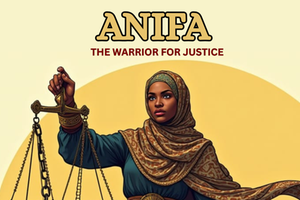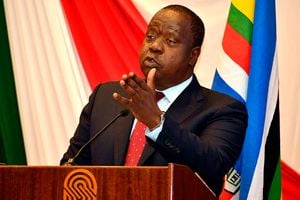
Demonstrators carry the body of a protester who was shot dead at Parliament Buildings during anti-government protests in Nairobi on June 25, 2024.
I remember seeing David Chege’s mum for the first time at his funeral in Mangu, Kiambu County.
I hugged her tightly, lost for words. Nothing I could say would ever match the weight of her grief, the pain of having seen her son’s skull plastered on the tarmac, shot by a sniper straight to the head. That memory will never leave me. It should not.
Because that is the cost we paid for imagining a better Kenya. A Kenya where being young, brave and unarmed didn’t make you a target.
I remember Eric, wounded and recovering at Nairobi West Hospital, asking me with a tired smile: “When are we going back to the streets?” Wounded. Smiling. Relentless.
I remember Eustance, a 12-year-old boy, asking for time—just time—to think about what it meant to lose his right leg. To imagine a life without football. To say goodbye to a future he had always assumed would include running.
And I remember Abdulkhadir at Kenyatta National Hospital, so full of life, holding my hand, telling me he would walk again, even with a bullet in his spine. He died a few days later.
These are people I knew. People I loved. People whose names I whisper to myself when I see how quickly this country wants to move on as if last year’s protests were a blip, an inconvenience, not a national awakening.
Now, I hear the same recycled phrases being thrown around again: that we need “strong” leadership. That this country is too wild and undisciplined to be trusted with freedom. That we need to be put in our place.
But I have seen what “strong leadership” really looks like. I have seen its aftermath in hospitals and mortuaries. I have sat with grieving families. I have collected the names of the dead and coordinated burial funds. I have visited survivors whose lives will never be the same. And I have watched, with both pride and heartbreak, as the youth stood up to a system that has long treated us as disposable.
Bad taxes
We were not just protesting bad taxes. We were rejecting a way of governing that relies on fear instead of service, obedience instead of participation, and silence instead of truth. We dared to believe that our lives should count. That our voices mattered. That no one, no matter how powerful, had the right to treat us like noise.
And we did what no government has ever succeeded in doing: we came together. Tribeless. Partyless. Leaderless. We crossed every line they have used to divide us—ethnicity, class, geography, language—and built something no one saw coming: solidarity.
It was raw. It was real. And it was revolutionary.
So when I see the current longing for “decisive” leadership, I have to ask: do you mean leadership that serves or leadership that silences?
Because we have already seen what the latter looks like. We have buried its consequences. We have comforted its victims.
And we have also seen what real leadership looks like. I saw it last year in the young people who organised rescue routes under clouds of tear gas, in the medics who patched up wounds in backrooms, in the lawyers who stayed up all night processing bail papers, in the mothers who turned mourning into a movement.
We did not wait for orders from above. We moved because we had to. That is leadership. That is power. And it terrifies those who have built careers on the lie that only the elite can lead.
Demanding change
The calls for a return to “order” are not innocent. They are not just about systems. They are about erasing what we proved last year: that the people, especially the youth, are capable of organising, resisting and demanding change on their own terms.
They want us to forget. To forget the chants, the songs, the courage. To forget the tears, the rage, the brilliance. To forget the images of bleeding students, of mothers collapsing beside coffins, of youth carrying each other to safety. They want us to forget so they can convince us it never happened, and if it did, it was futile. But I remember. And I refuse to let the memory be a casualty of convenience.
The protests did not fail. They revealed. They revealed the brutal cost of speaking the truth in this country. They revealed the indifference of leadership that treats dissent as an attack. But more importantly, they revealed us to ourselves. They showed us our strength. Our creativity. Our unstoppable will to care for each other when the system will not.
And that revelation scared them.
Because when you have built your power on people’s hopelessness, the last thing you want is a population that believes it can govern itself.
We did not ask for chaos. We asked for accountability. We asked for healthcare, education and dignity. We asked not to be shot for demanding those things. And when they met us with bullets, we still came back with hope.
That kind of spirit cannot be manufactured, it can only be earned. And we earned it in blood and breath and sleepless nights. We earned it by showing up for each other. By refusing to back down. By remembering the names. David. Eric. Eustance. Abdulkhadir and the 70+. We do not forget.
So when people say Kenya needs order, I say: whose order? And at what cost?
The question is not whether we are ready for change. The real question is: are you ready for us?
Lewis Ngunyi: Matiang’i’s 2027 bid and Kenya’s fork in the road










